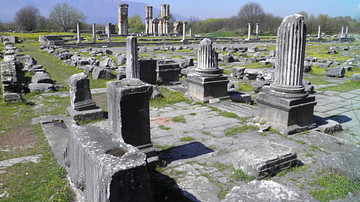Search Definitions
Browse Content (p. 229)

Definition
Livia Drusilla
Livia Drusilla (58 BCE - 29 CE) was the third wife of emperor Augustus of Rome, mother of emperor Tiberius, and grandmother of emperor Claudius. She was one of the great women in history who achieved prominence living in the shadow of a strong...

Definition
Daedalus
Daedalus is a figure from Greek mythology famous for his sculptures, clever inventions, and as the architect of the Minotaur's labyrinth on Crete. Daedalus is the father of Icarus who flew too close to the Sun on his artificial wings and...

Definition
Phocion
Phocion (c. 402 – 318 BCE) was an Athenian statesman and military commander who, according to tradition, was made a general a staggering 45 times. A student of Plato and known as 'the Good', his political position was somewhat ambiguous...

Definition
Aristides
Aristides (520s – c. 467 BCE) was an Athenian statesman and military commander who gained the honorific title 'the Just' through his consistent selfless behaviour in public office. Although ostracized by the Athenian assembly, Aristides returned...

Definition
Gymnasium - The Ancient Greek Building for Sport & Study
The Gymnasium was a Greek building originally used for athletic activities but which came, over time, to be used also as a place of study and philosophical discussion. In the Hellenistic Period, gymnasia became highly standardized both in...

Definition
Fasces
The fasces were a bundle of rods and a single axe which were carried as a symbol of magisterial and priestly authority in ancient Rome. They featured prominently in important administrative ceremonies and public processions such as triumphs...

Definition
Melqart
Melqart (also Melkarth or Melicarthus) was an important Phoenician god and patron deity of the city of Tyre. Associated with the monarchy, sea, colonization, and commercial enterprise, both at home and abroad the god is a significant, if...

Definition
Roman Triumph
A Roman triumph was a spectacular celebration parade held in the ancient city of Rome for a military commander who had won an important victory on the battlefield. Granted by the Senate, it was a lavish and entertaining propaganda spectacle...

Definition
Philippi
Philippi was an important city in eastern Macedon which flourished in the Hellenistic, Roman, and Byzantine Periods. Situated between the Strymon and Nestos rivers, the city was valued in antiquity for its nearby gold mines. Site of the famous...

Definition
Theseus
Theseus is a legendary hero from Greek mythology who was considered an early king of Athens. Famously killing villains, Amazons, and centaurs, Theseus' most celebrated adventure was his slaying of the fearsome Minotaur in the labyrinth of...